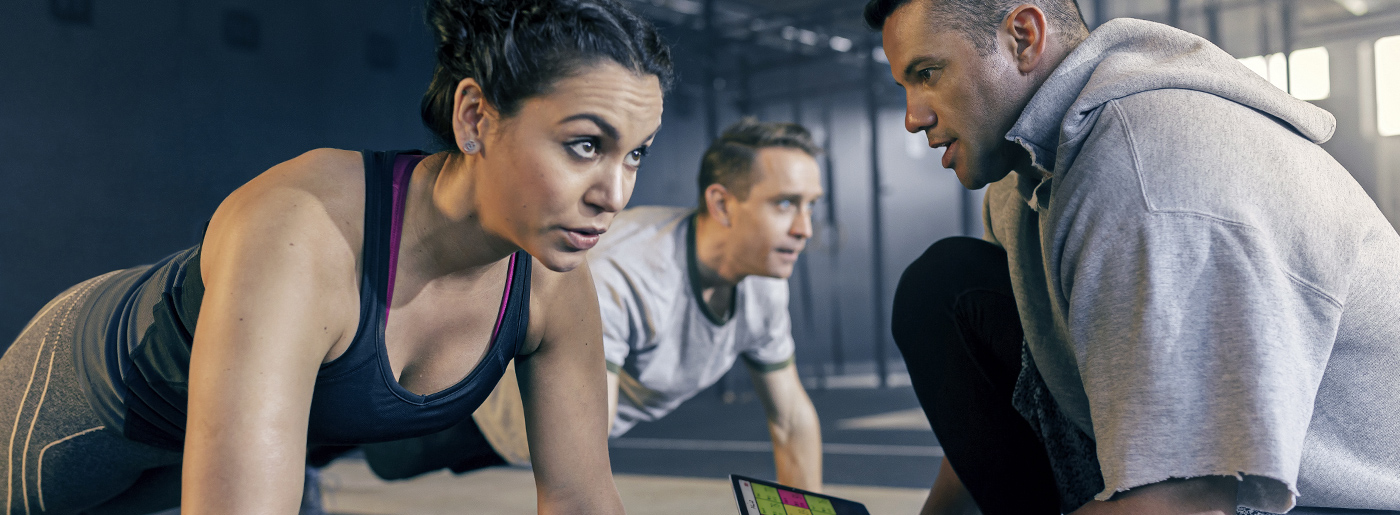Whether you’re falling short of your fitness goals or you’re not sure where to start with them, you may be asking yourself the same question. Should I get a personal trainer? And for good reason – having a personal trainer at your disposal can take all the guesswork out of training. A great trainer can help you define your goals, create a plan of attack for conquering them, and hold your hand – if that’s what you’re into – every step of the way. But a bad trainer? A less-than-stellar trainer may derail your fitness plans, or could take you down a road you’re not feeling in order to reach them.
“Anyone can tell you that if you see them once a week for three months, you’ll be in great shape,” says NASM-certified personal trainer Kim Hoban. “But does that really fit the goal you have in mind? Probably not.” The search for the perfect trainer can seem daunting, but when you find someone you click with, the rewards can be life changing. Here are four questions to ask yourself before committing to a personal trainer.
1. What am I really looking for?
“The first thing people should do when they’re considering hiring a trainer is a simple gut check,” says Kim Hoban. “What are you really looking for?” Are you a runner looking to add a strength-training regimen to your marathon-training program? Or are you training for your first bodybuilding competition? Start by nailing down your goal and going from there. “So many people say they want a trainer, but that’s so generic,” says Hoban. “Try to get really specific instead.”
2. What kind of relationship do I want?
There’s a stark contrast between a BFF-like trainer and one who’s ready to dish out tough love in order to ensure results, so it’s crucial to identify which type of person will help you reach your goals. While the best-friend-worthy trainer may be more fun for the duration of each session, be honest with yourself: Are you willing to work as hard for the person as you would with someone you’re afraid of letting down? Do you want your hand held a little, or do you thrive with a little well-intentioned trash talking?
“Definitely ask about his or her coaching style,” says Hoban. “Do you want a cheerleader or a drill sergeant?” Don’t hesitate to ask for references, testimonials, or referrals from past or current clients. (And definitely ask about credentials, certifications, and education.) “But know yourself, what you need, and what you do well with,” Hoban says. “Sometimes it’s the same thing you prefer in a work setting or in your personal relationships, but it might be totally different. You may not want a significant other to tell you exactly what to do, but that might be exactly what works when it comes to a trainer.”
3. Am I willing – and able – to do the work and be totally honest about it?
When your dentist asks whether you floss daily, do you fess up and admit you’ve been slacking in the dental hygiene department? Or do you lie and say you totally floss twice a day? What about when your physical therapist asks if you’ve been doing your glute exercises and foam rolling at home? If you’re going to put the time, energy, and money into hiring a personal trainer, you also need to be willing to fully commit in those three areas. And if you’re falling short somewhere, it’s important to talk to your trainer about it.
“People tend to fall into a negative mindset of, ‘I’m being bad and shouldn’t tell my teacher,’” Hoban says. “But you can be honest!” If you swear you’ve been doing your track workouts every week but your times aren’t getting faster, your trainer is probably going to sense that something is up – so you may as well talk it out. “As a trainer, it’s my job to ask if something is getting in your way, what the obstacles are, or how we can make adjustments so you meet your goals,” says Hoban. Sure, your trainer is technically in charge of your workouts, but you’re the one with the big goals, so take on a teammate mindset if you’re serious about reaching them.
4. Am I going to be comfortable breaking things off with this person if it doesn’t work out?
In one sense, your relationship with your personal trainer is just that: it’s personal, and it’s a relationship. But, Hoban says, it’s also a business transaction. “It’s a financial relationship,” she says. “You’re paying someone for a service. So if you’re not getting what you need, you should be able to manage that.” And just like with a personal relationship, that’ll mean one of two things: either communicating to make it work, or breaking it off. “If you really want to end it, it’s a great idea to be open and honest about why,” Hoban says. “That’s the only way someone can grow, move forward, and become a better trainer down the road.”
In the spotlight

Kim Hoban
If you liked this post, don’t forget to share so that others can find it, too.
Please note that the information provided in the Polar Blog articles cannot replace individual advice from health professionals. Please consult your physician before starting a new fitness program.





